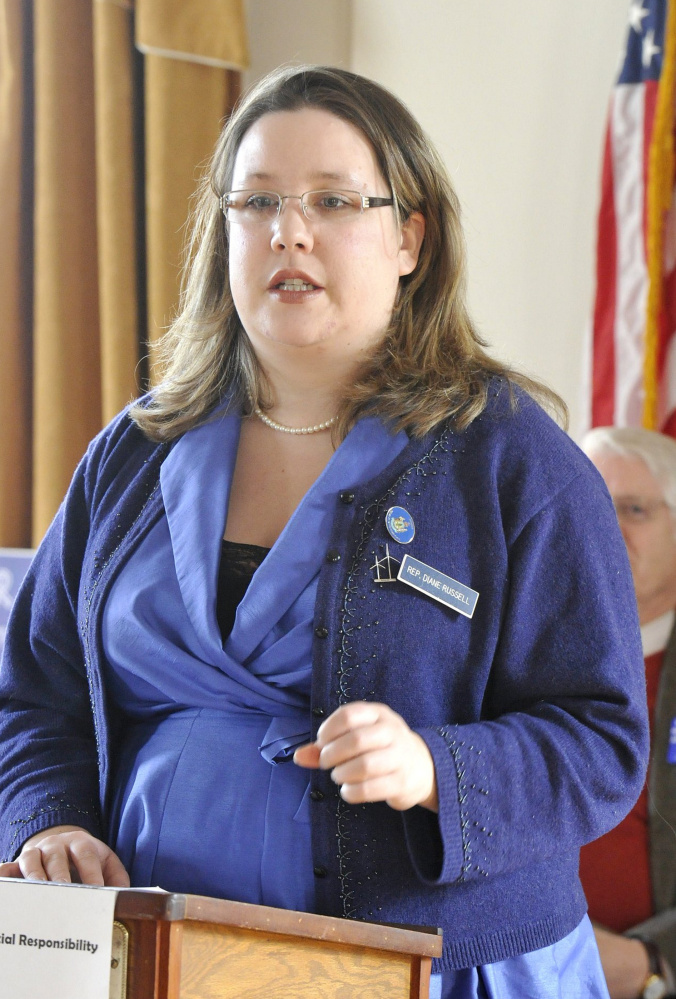AUGUSTA — Maine’s ethics commission voted Wednesday to fine state Rep. Diane Russell of Portland $500 over an email list that her campaign used to raise nearly $90,000 for her unsuccessful Senate bid earlier this year.
The panel unanimously rejected another complaint, however, alleging that Russell used her political action committee as an “unregulated money mill” to benefit herself.
The complaints against Russell – an outgoing lawmaker active in progressive circles in Maine and nationally – were lodged at the tail end of a bruising, three-way Democratic race that saw unprecedented spending for a state legislative primary. Rep. Ben Chipman, D-Portland, defeated Russell and Charles Radis by a wide margin, securing the Democratic bid to fill a seat being vacated by Sen. Justin Alfond.
Portland resident Michael Hiltz – a Chipman supporter – had filed a complaint against Russell in June alleging she violated the state’s campaign finance rules by failing to disclose the contribution of an email list containing more than 130,000 names to her campaign. Russell contended that the list was her personal property and was not owned by the Working Families Political Action Committee that she operated.
On Wednesday, the Maine Commission on Governmental Ethics and Election Practices voted unanimously to fine Russell $500 after determining she violated the state’s campaign finance laws by failing to disclose the in-kind contribution of the email list.
Russell later used an updated version of that list – which she had been compiling since 2011 – to solicit the vast majority of the $89,000 in donations her campaign received from activists nationwide. Russell and her attorney said Wednesday that at the time the candidate “contributed” the list to her campaign, it was likely worth about $1,500 but that she had no idea it would generate such a large response from donors.
“I honestly didn’t think there was any value to it,” Russell told commission members. “I knew that I had built something big but I really had no idea. And so I didn’t think of it as something that needed to be reported.”
Commission members accepted Russell’s $1,500 estimate after commission executive director Jonathan Wayne said he “wouldn’t quibble” with the value.
The commission rejected a separate complaint by Hiltz questioning whether the Working Families Political Action Committee – a so-called “leadership PAC” used by many legislators – met the state’s definition of a PAC. Hiltz also pointed to the fact that the Working Families PAC had spent tens of thousands of dollars on travel, meals and payments to Russell herself while only donating $1,550 to other candidates and organizations.
“I contend that the Working Families PAC has in fact served as an unregulated money mill for its principal officer, Diane Russell, during that time,” Hiltz wrote in his June 3 request for a commission investigation.
Commission members agreed with staff that Hiltz had not proven that any reporting violations had occurred and said Working Families PAC did, indeed, meet the definition of a PAC. But Wednesday’s discussion is part of a larger, long-running dialogue about the rules regulating so-called “leadership PACs” that can raise unlimited amounts of money from lobbyists, corporations or individuals. Lawmakers can use money from leadership PACs for a broad range of activities, including paying for their own trips to out-of-state meetings, buying meals for staffers or donating to their fellow legislators’ campaigns.
Critics have long blasted leadership PACs as a glaring hole in Maine’s otherwise tightly drawn campaign finance laws. But lawmakers have consistently rejected attempts to change the rules regarding leadership PACs – a reality check that came up during Wednesday’s discussions about the political action committees.
“I think we need to get our arms around the issue of these PACs in a more meaningful way,” said commission chairwoman Margaret Matheson. “I suspect that will not go down well in the legislative body.”
But commission member Richard Nass, a former state lawmaker, speculated that media scrutiny over Russell’s expenditures from her Working Families PAC – beginning with an investigation from the Maine Center for Public Interest Reporting – may have played a role in her loss during the primary. PACs are required to report how they spend their money for the press and public to see, Nass said.
“I think the whole thing works fairly well,” he said.
In other action on Wednesday, the commission voted 4-1 to assess a $150 fine on Biddeford resident Joanne Twomey for violating the state’s spending rules for candidates utilizing the Maine public campaign financing system.
Twomey paid a campaign manager, Perry Aberle, a total of $1,585 from her $10,000 stipend from the Maine Clean Election Act funds for work he reportedly performed before she was certified as a “Clean Elections” candidate. Aberle was paid a total of $2,500 from Twomey’s campaign funds for work he did throughout the campaign. State rules prohibit the use of Clean Elections funds for services prior to certification; instead, candidates are required to pay for any services from “seed contributions” of $5 to $100 that they collect in order to qualify for the public campaign finance system.
Twomey and Aberle acknowledged the mistake but said they had been unclear about the rules. Commission members appeared to accept their explanation that it was an honest mistake and did not require repayment of the funds but did assess a $150 fine. The campaign was also fined $150 for a late filing with the ethics commission.
Twomey also returned roughly $1,500 in unspent Clean Elections funds from her unsuccessful bid for the Democratic nomination in the Senate District 32 primary, which was won by incumbent Sen. Susan Deschambault.
Send questions/comments to the editors.




